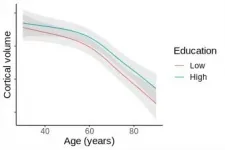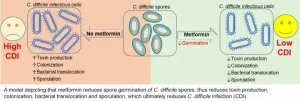(Press-News.org) "This finding suggests that higher education does not influence brain aging" says Lars Nyberg from Umeå University in Sweden, first author of the study and also a part of the Lifebrain consortium.
Brains shrink at the same rate
All brains shrink with age, and the dominant view has been that more education slows the rate of shrinking. However, the evidence has been inconclusive because studies have not been able to track the rate of change over time. Until now.
Measured brain shrinkage over time
The researchers measured brain aging by measuring the volume of the cortical mantle and hippocampus regions of the brain, in MRI scans from more than 2000 participants in the Lifebrain and UK biobanks. These areas of the brain are prone to shrinkage over time, as a natural part of aging. Participants' brains were scanned up to three times over an 11 year period, in what is known as a "longitudinal" study.
"This is what makes this study unique," says Nyberg. "The study is a large-scale longitudinal test, with replication across two independent samples, and is one of the largest of its kind."
The researchers compared the rate of the shrinkage of these areas in people who had attained higher education before the age of 30 and those without. The participants ranged from 29-91 years of age.
Higher education is modestly related to bigger brains
Whereas the rate of brain change was similar in participants with and without high education, the researchers found that those with high education had slightly larger cortical volume in a few regions, but even in these regions the rate of change was unrelated to education.
"The study does not say that education is not important," stresses Anders Fjell from the University of Oslo, also one of the main authors of the paper.
"Education is associated with advantages in life, but we cannot from this study say whether education caused these advantages. If people with high education have larger brains to begin with, this may delay the onset of dementia or other conditions associated with lower cognitive functioning," says Fjell.
"The bottom line is that all people's brains shrink eventually, but the rate of this shrinkage does not seem to be affected by how many years you spent in school," concludes Fjell.
About the Lifebrain consortium
Lifebrain is an EU-funded Horizon 2020 consortium integrating data from 6000 research participants collected in 11 European brain-imaging studies in 7 countries. The major goal of the project is to ensure a fuller exploitation, harmonization and enrichment of some of the largest longitudinal studies of age differences in brain and cognition in Europe.
About the study
Lars Nyberg serves as professor of neuroscience and director of the Umeå Center for Functional Brain Imaging (UFBI) in Sweden, and as professor II at the Department of Psychology at the University of Oslo (Norway).
Anders Fjell serves as professor of cognitive psychology at the Center for Lifespan Changes in Brain and Cognition at the Department of Psychology, University of Oslo (Norway), and as a researcher at Oslo University Hospital, Department of radiology and nuclear medicine.
The study was performed in collaboration with Copenhagen University Hospital Amager and Hvidovre, University of Barcelona, University of Lubeck, Max Planck Institute for Human Development, Max Planck UCL Centre for Computational Psychiatry and Ageing Research, Vitas AS, University of Oxford, University of Geneva, University of Cambridge, VU University Medical Centre Amsterdam, Oslo University Hospital and University Clinic Hamburg-Eppendorf.
This project has received funding from the European Union's Horizon 2020 research and innovation programme under grant agreement No 732592.
INFORMATION:
EUGENE, Ore. -- April 27, 2021 -- The addition of meat alternatives such as poultry and fish is not reducing the global production and consumption of energy-gobbling land-based meats, according to new research.
That conclusion comes from an analysis of 53 years of international data by University of Oregon sociologist Richard York, who focuses on energy consumption in relationship to economic issues such as power and inequalities, and politics. His findings published April 26 in the journal Nature Sustainability.
"If you have increases in the production of poultry and fish, it doesn't tend to compete with or suppress other meat source consumption," York said. "It would be great if more ...
Shopping habits and escalating consumption of many consumers are inflicting a heavy environmental toll, and while the majority of customers seem hesitant to act "green" on their own, companies are increasingly expected to implement effective eco-friendly tactics. But efforts to increase towel reuse at hotels, paperless adoption in the banking industry or "ugly" food consumption at grocery stores have been challenging.
As a result, millions of tons of cosmetically imperfect produce are wasted every year in the United States while about one billion trees worth of paper are thrown away. Electricity consumption ...
An international, multidisciplinary team that includes faculty members from The University of Texas at Arlington has published a paper in the journal Philosophical Psychology that wades into the debate about whether fish feel pain.
Their conclusion: while fish lack certain regions of the brain typically associated in humans with processing the unpleasantness of pain, this does not offer definitive proof that fish don't experience painful events.
There is a divide among contemporary scientists and philosophers on the issue of animal suffering, particularly in fish. Following the discovery of pain receptors in fish in the early 21st century, scientists developed behavioral experiments that seemed to show that fish ...
Rockville, Md. (April 27, 2021)--Deep heat creams widely used by athletes to soothe sore muscles may also boost performance when applied before exercise, according to new research presented virtually this week at the American Physiological Society's (APS) annual meeting at Experimental Biology 2021.
Researchers at Nanyang Technological University in Singapore studied a small group of male volunteers to determine the effects of deep heat cream on exercise endurance. Each volunteer participated in two trials--one where he applied a thin layer of a commercially available ...
Rockville, Md. (April 27, 2021)--Researchers from Wake Forest School of Medicine in North Carolina have demonstrated that a common diabetes drug inhibits the spread of Clostridioides difficile, or C. diff--a potentially life-threatening infection commonly acquired during hospital stays. The team will present their work virtually at the American Physiological Society's (APS) annual meeting at Experimental Biology 2021.
C. diff is the most common hospital-acquired infection in the U.S. It starts in the intestines, often after a course of antibiotics. The Centers for Disease Control and Prevention categorizes the bacteria C. diff as a public health threat that "require[s] urgent and aggressive action." In 2017, ...
Rockville, Md. (April 27, 2021)--The popular herbicide Roundup® has been in the news because of concerns its main ingredient, glyphosate, might cause cancer. Now researchers from Florida Atlantic University (FAU) are evaluating the pesticide for potential neurological impacts. This week, the scientists will present their work virtually at the American Physiological Society's (APS) annual meeting at Experimental Biology 2021.
The roundworm Caenorhabditis elegans (C. elegans) is a microscopic worm that lives in soil and feeds on bacteria. Scientists have studied it extensively since the 1960s to better understand fundamental physiological processes of the animal kingdom. Because roughly 38% of its genes have counterparts in humans, findings ...
Rockville, Md. (April 27, 2021)--High-intensity cycling in very short bursts can lead to performance and health benefits in just 10 minutes a day, according to a new study to be presented virtually this week at the American Physiological Society's (APS) annual meeting at Experimental Biology 2021.
Young adult volunteers participated in high-intensity cycling three times a week for eight weeks. They cycled at maximum effort for four seconds and rested for 15 to 30 seconds before beginning another four-second sprint. Each sprint-rest bout was repeated up to 30 times in a single workout session, for a total of 10 minutes.
By the end of the trial ...
Rockville, Md. (April 27, 2021)--A new study by researchers at the VA Portland Health Care System in Oregon found that augmenting traditional treatment for traumatic brain injury (TBI) with morning bright light therapy (MBLT) improved physical and mental symptoms for participants. The team will present their work virtually at the American Physiological Society's (APS) annual meeting at Experimental Biology 2021.
According to the U.S. Department of Veterans Affairs (VA), over 185,000 veterans have been diagnosed with at least one TBI. TBI is both a common and complex injury. Because of the circumstances surrounding the brain injury, TBI frequently coincides with posttraumatic stress disorder ...
Rockville, Md. (April 27, 2021)--Fatty acid supplements may protect children with high cholesterol from heart disease later in life by increasing their blood levels of healthy omega-3 fatty acids, according to a new study. Researchers from the Uniformed Services University of the Health Sciences in Bethesda, Maryland, will present their work virtually this week at the American Physiological Society's (APS) annual meeting at Experimental Biology 2021.
Previous research has shown that high blood levels of beneficial fatty acids, including omega-3 fatty acids, eicosapentaenoic acid (EPA) and docosapentaenoic acid (DPA) found in seafood, are associated with a lower risk of coronary artery disease and a higher likelihood of healthy aging. "Since coronary artery ...
Rockville, Md. (April 27, 2021)--A new study reveals that renin-angiotensin system (RAS) genes within the amygdala--the brain region important for traumatic memory processing--express differently when the brain develops fearful memories, such as when people undergo traumatic stress. Researchers have found that medication may potentially be used as a pharmacological blockade of the angiotensin type 1 receptor, thereby improving components of fear memory as assessed by freezing behavior. The research team from George Washington University in Washington, D.C., will present their findings virtually at the American Physiological Society's (APS) annual meeting at Experimental Biology 2021.
Post-traumatic stress disorder (PTSD) is a strong predictor ...






